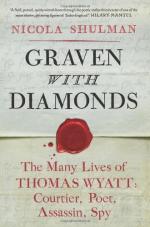|
This section contains 3,986 words (approx. 14 pages at 300 words per page) |

|
SOURCE: "Listening to Wyatt," in The American Poetry Review, Vol. XVIII, No. 2, pp. 51-54.
In the following essay, Merwin reevaluates Wyatt's work and life, bestowing credit where he believes it has been lacking.
What we hear when we read the poems of Sir Thomas Wyatt, some four and a half centuries after he wrote them, is a fair example of the ways of that elusive but inescapable figure who haunts the imagination of the Renaissance: Fortuna, that "torne as doeth a ball." There is no way of knowing now what Wyatt's poems sounded like to his contemporaries. His lyrics for the lute must have circulated as songs, and his other poems were read in manuscript, but their reception, their readers, their fate are, with very few exceptions, unknown to us. We do not really know, either, where Wyatt acquired his sense of what was available and desirable in...
|
This section contains 3,986 words (approx. 14 pages at 300 words per page) |

|


